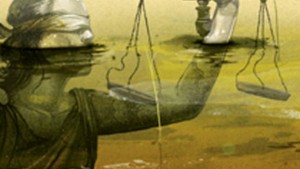The President of the Mountain States Legal Foundation, William Perry Pendley, has become a highly sought-after speaker in recent years, partly because the work of his organization is interesting to audiences throughout the West, but also because he is a gifted and entertaining speaker. He often begins speeches with the always-amusing opener, “My name is Perry Pendley; I sue people, and I love it!”
The number of Americans who love suing each other has been increasing for years, and lawsuits filed on environmental issues number in the thousands every year. Regulated businesses, individuals, and especially environmental organizations, file an astonishing number of lawsuits. Our nation’s environmental policy on many issues is now determined more by lawsuits and court orders than by public debate and the democratic process. America’s environment is cleaner and healthier than ever, and is still improving. Yet we sue each other constantly.
 In fact, this focus on litigation may be the most significant change in environmental policy of our generation. While Americans in general sue each other at an unparalleled rate, no economic sector compares with the environmental movement in the skill, scope, and sheer magnitude of these lawsuits. Most of the major conservation groups have separate legal arms for this sole purpose. Dealing with them is now a regular part of the cost of doing business in every industry related to natural resources.
In fact, this focus on litigation may be the most significant change in environmental policy of our generation. While Americans in general sue each other at an unparalleled rate, no economic sector compares with the environmental movement in the skill, scope, and sheer magnitude of these lawsuits. Most of the major conservation groups have separate legal arms for this sole purpose. Dealing with them is now a regular part of the cost of doing business in every industry related to natural resources.
The Sierra Club’s original legal arm, now called EarthJustice, has filed literally thousands of environmental lawsuits since its founding in the late 1960s, nearly all of them against federal agencies, today at the rate of two every month. Similar legal branches have been created all over the country by environmental organizations large and small, at nearly every level.
Across the country each year, the scale of this legal activity is so staggering it can scarcely be measured. One impressive attempt was undertaken by Professors Theodore Eisenberg and Kevin Clermont at Cornell Law School. Eisenberg is one of the foremost authorities on legal system empirical data and an advisor to the Justice Department. The Cornell database resulting from his work tracks around 260,000 civil lawsuits by type and disposition, showing the alarming expansion of Americans’ litigious tendencies. The total number of such lawsuits increased over 9.2% between 1987 and 2000. But lawsuits related to environmental matters, during the same period, increased by a whopping 65% (from 555 in 1987 to 914 in 1999 and over 1,000 in 2000 and every year since). In other words, three environmental lawsuits are filed in the United States every day.
Certainly there has always been a place in conservation for stopping damaging activities. During the 1960’s and 1970’s, there was in fact a desperate need to stop air and water pollution, abusive clear-cutting of vast forests, overuse of dangerous pesticides, and outrageous trash dumping. There will always be a need to stop bad behavior. But the truth is that many of these battles have been won. That’s not to say there is no more pollution, but in general the American public has little sympathy for polluters. Government regulations successfully stop the most egregious examples, and the nation’s air and water are cleaner than at any time since European settlement. Public opinion has been thoroughly won over to the conservation ethic, and public policy has followed – as it should.
But this obsession with lawsuits has gone far beyond stopping bad behavior, and now delays a wide range of projects simply as a tactic for killing them, adding billions to our cost of living. They are no longer just a means for enforcing the law, but for raising money and accumulating power for these organizations. More often than not, taxpayers pay for both sides of the litigation.
Clearly, our generation has lost its way on these important issues. Conservationists like Theodore Roosevelt, Gifford Pinchot, John Wesley Powell and John Muir could never have started a century-long conservation movement by trying to stop the economic progress of mankind. Rather, they knew that both the beauty and the productivity of the land needed to be sustained forever. To them that meant the ability of the land to sustain life – its life and ours.
Today, that kind of vision is blurred by constant bickering, disagreement, appeals, and lawsuits. Perhaps that’s what Voltaire meant when he famously wrote, “I was never ruined but twice – once when I lost a lawsuit, and once when I won one.”
(A version of this column appeared in the Grand Junction Daily Sentinel May 8, 2015)




Comments on this entry are closed.